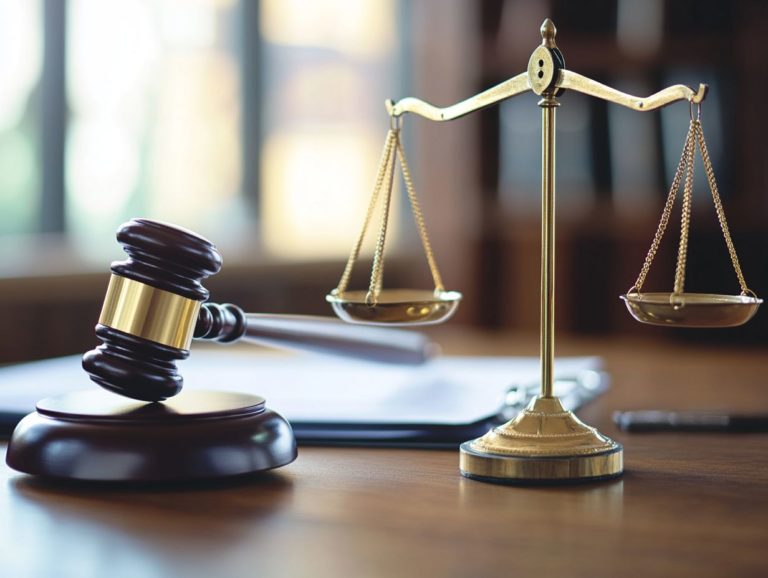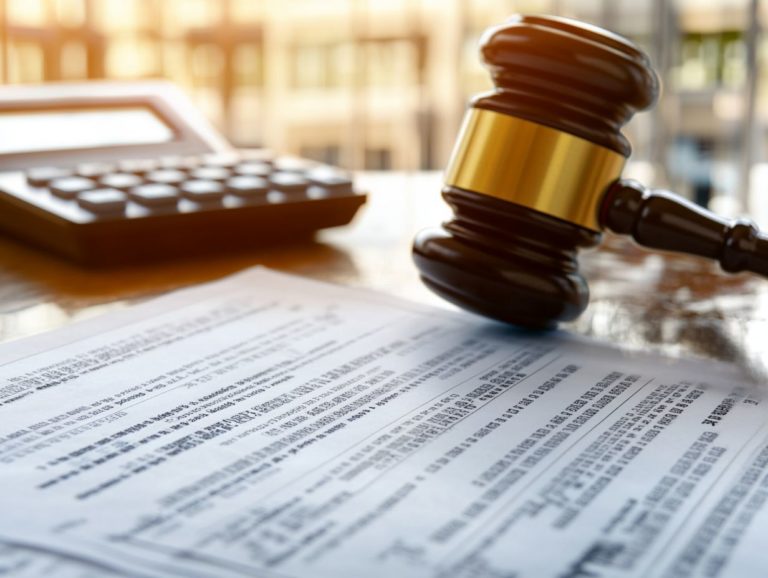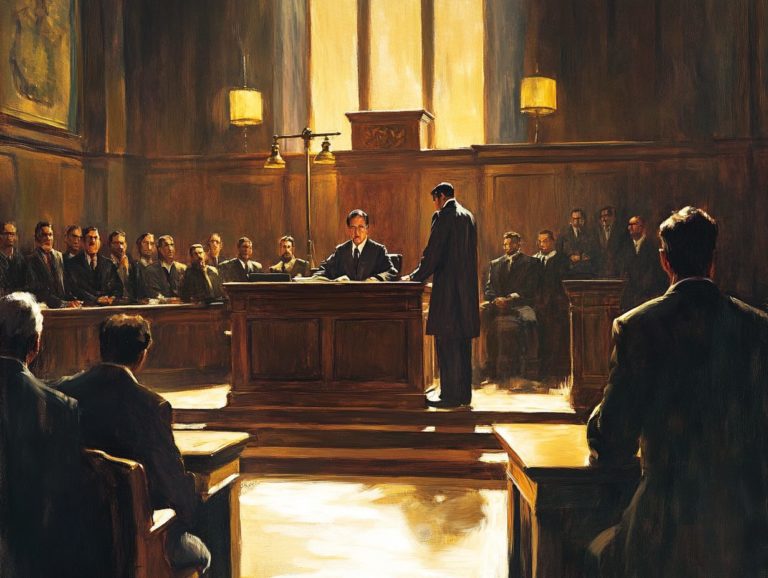What Are the Responsibilities of a Defense Attorney?
Every legal system hinges on the indispensable role of defense attorneys, who serve as champions for the accused. They safeguard their rights throughout the judicial process.
This article reveals the vital work of defense attorneys, detailing their myriad responsibilities, from representing clients to gathering evidence and crafting courtroom strategies.
Discover how defense attorneys navigate intricate cases, engage with various parties, and relentlessly pursue a fair trial.
Whether you’re intrigued by the legal system or contemplating a career in defense, this overview provides valuable insights into their essential contribution to justice.
Contents
- Key Takeaways:
- What Does a Defense Attorney Do?
- Responsibilities of a Defense Attorney
- Communication with Clients and Other Parties
- Presenting the Defense in Court
- Ensuring a Fair Trial for the Client
- Frequently Asked Questions
- What are the responsibilities of a defense attorney?
- What is the primary duty of a defense attorney?
- What are the ethical responsibilities of a defense attorney?
- What is the role of a defense attorney during a trial?
- What are the responsibilities of a defense attorney in a plea bargain?
- What other responsibilities does a defense attorney have?
- Responsibilities of a Defense Attorney
Key Takeaways:
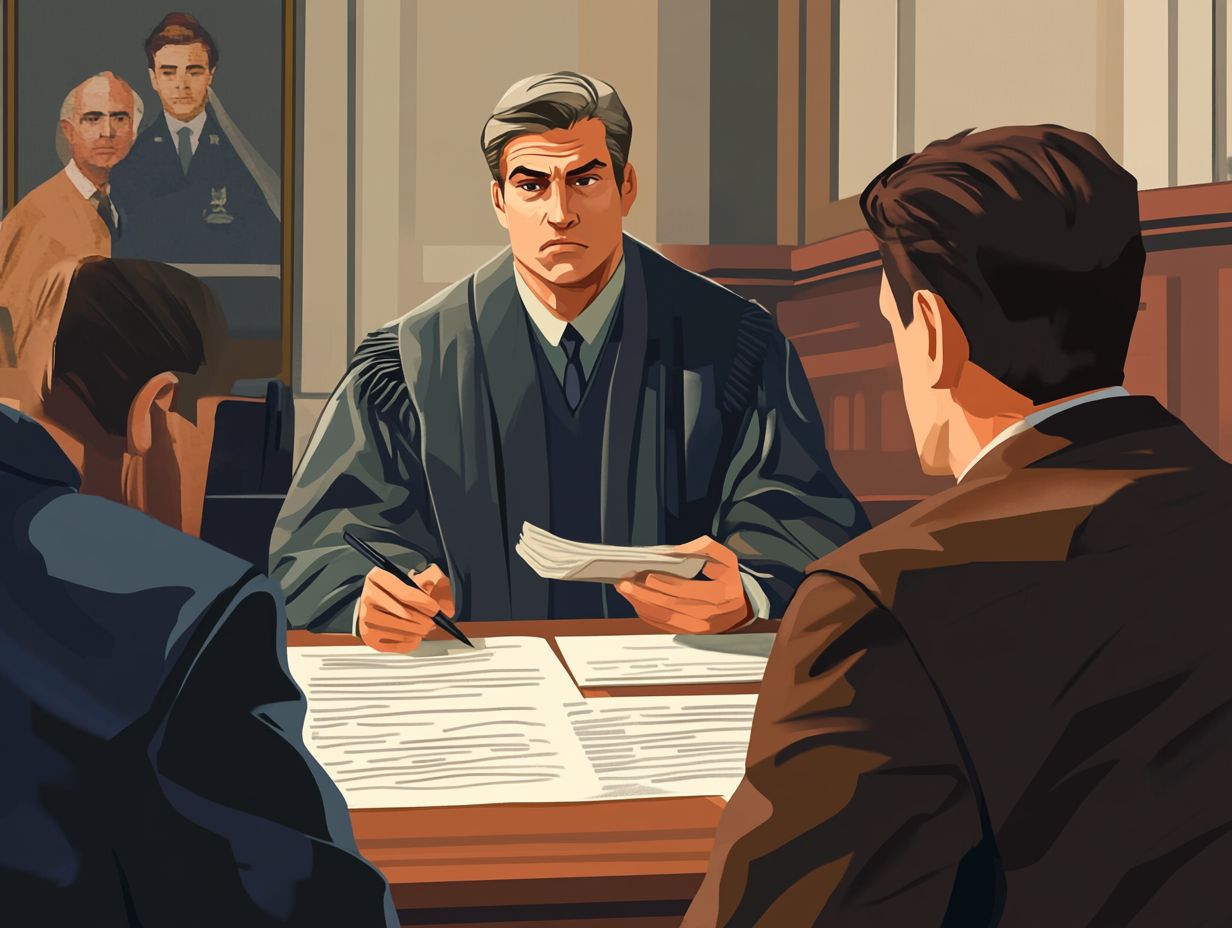
- A defense attorney’s main job is to represent their client and defend their rights in court.
- They investigate evidence, develop a legal strategy, and present the defense effectively.
- Good communication with clients and maintaining confidentiality are vital to achieving the best outcome.
What Does a Defense Attorney Do?
The role of a defense attorney is crucial in the U.S. criminal justice system. They encompass a wide array of responsibilities designed to protect your rights and ensure a fair trial process.
A skilled criminal defense attorney does more than just provide legal representation. They craft a robust legal strategy tailored specifically to your needs, requiring a deep understanding of your rights under the Constitution, legal documents, and the complexities of the charges you face.
In this intricate legal landscape, your defense attorney becomes your advocate. They expertly guide you through every stage of the criminal proceedings, from case investigation to courtroom representation.
Responsibilities of a Defense Attorney
The responsibilities of a defense attorney are multifaceted and essential for providing an effective legal defense for clients facing criminal charges. Each aspect of their role plays a critical part in safeguarding your rights and navigating the complexities of the legal system.
Client Representation
Client representation is at the heart of your defense attorney’s responsibilities. They ensure that your rights are upheld throughout the criminal justice process.
These attorneys serve as your frontline advocates. They tirelessly work to maintain the principles of justice and fairness, challenging evidence and spotlighting procedural errors.
They emphasize the importance of attorney-client privilege, which protects the confidentiality of your communications. This privilege fosters open and honest dialogue, allowing your defense counsel to explore every available legal avenue.
Whether negotiating plea bargains or preparing for jury trials, you benefit from a comprehensive strategy tailored specifically to your situation. This underscores the pivotal role of legal counsel in securing equitable representation in the courtroom.
Investigation and Evidence Gathering
Effective case investigation and evidence gathering are critical tasks for you as a defense attorney. They directly shape the foundation of a robust legal argument.
Your process begins with a meticulous review of all prosecution evidence. Identifying weaknesses or inconsistencies is essential to undermining the case against your client.
Challenging these elements not only exposes potential flaws but also ensures that the rights of the accused are zealously protected.
Often, expert witnesses become pivotal to your defense strategy. Their specialized knowledge can clarify complex issues and offer alternative explanations for the evidence presented.
This expert testimony can fortify your position, transforming what may seem like damaging evidence into a framework for reasonable doubt. Ultimately, this enhances your legal narrative and creates a more compelling case.
Legal Strategy and Defense Planning
Developing a robust legal strategy and defense plan is crucial for you as a defense attorney. It shapes your overall approach to the case.
A well-structured case strategy sets the tone for courtroom proceedings and plays an important role in negotiations, particularly regarding agreements where a defendant pleads guilty to a lesser charge.
By thoroughly assessing the evidence and identifying potential weaknesses in the prosecution’s case, you can craft persuasive arguments that promote favorable outcomes.
This preparation also includes understanding the implications of various charges, allowing you to navigate discussions with the prosecution with skill.
A comprehensive defense strategy can lead to more advantageous plea negotiations and, if necessary, effective trial preparation that underscores the defendant’s rights and presents compelling evidence.
This approach significantly increases the likelihood of a positive resolution.
Communication with Clients and Other Parties
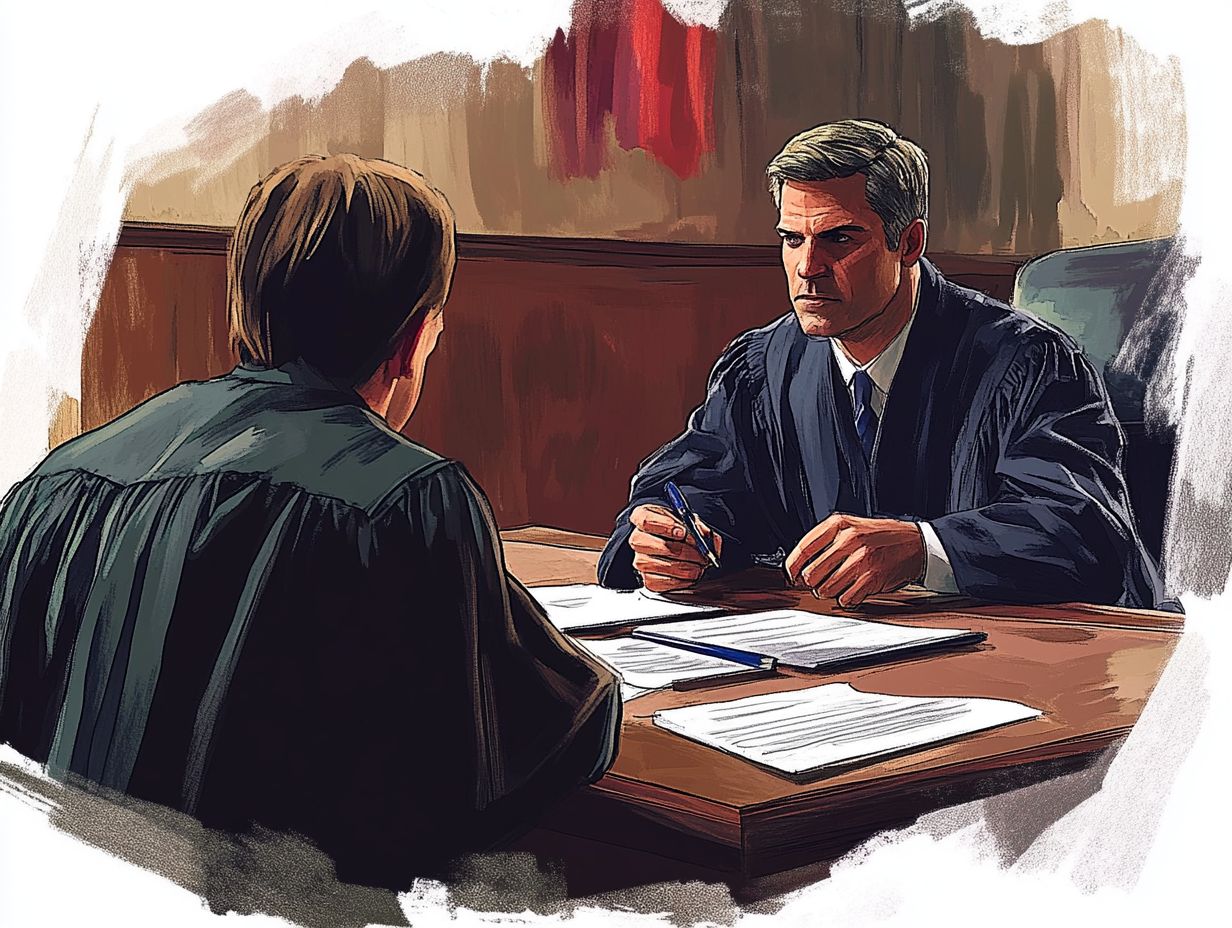
Good communication makes a big difference for you as a defense attorney. It enables you to articulate complex legal concepts clearly and negotiate skillfully on behalf of your clients.
Maintaining Attorney-Client Privilege
Maintaining attorney-client privilege is essential. It ensures you feel secure sharing sensitive information with your defense attorney.
This confidentiality creates a foundation of trust. It allows you to disclose crucial details that could significantly impact your case.
When this privilege is upheld, you can explore your circumstances openly, free from fear, leading to more effective legal strategies.
However, breaching this privilege can have severe consequences, jeopardizing not only the defense’s strategy but also your rights.
A violation may result in critical evidence being deemed inadmissible. It could undermine your attorney s ability to defend you effectively, ultimately affecting the pursuit of justice.
Negotiating with Prosecution
Negotiating with the prosecution is an essential skill to master as a defense attorney. It significantly impacts your ability to secure favorable plea deals for your clients.
The negotiation process demands a profound understanding of both the law and the unique circumstances of each case.
Effective defense attorneys employ various strategies, such as cultivating a strong rapport with prosecutors and emphasizing mitigating factors that could lead to a more beneficial agreement.
The outcome often hinges on your ability to advocate persuasively for your clients. Your negotiation skills can minimize penalties and promote rehabilitation over mere punishment.
These skills extend beyond mere persuasion; they require a sharp sense of timing and strategy. You must adeptly navigate the intricate web of the legal system.
Presenting the Defense in Court
Presenting the defense in court is where your skills as a defense attorney truly come into play. Every moment counts when you’re in court.
This demand requires meticulous preparation and exceptional courtroom representation to advocate effectively for your client.
Cross-Examination of Witnesses
Cross-examination of witnesses stands as a pivotal duty for defense attorneys. It serves as an important tool to challenge the prosecution s narrative.
By employing various techniques like strategic questioning and pinpointing inconsistencies in testimony you can dissect the credibility of witness statements.
The significance of meticulous preparation is paramount. Immersing yourself in every aspect of the case, from the backgrounds of witnesses to any potential biases, is essential.
Effective questioning often uncovers uncertainties that can instill reasonable doubt in jurors, ultimately influencing their perceptions and decisions.
Mastery of these strategies enables you to advocate passionately for your clients in the demanding courtroom landscape.
Presenting Evidence and Arguments
Presenting evidence and arguments effectively in court is crucial for you as a defense attorney. It lays the foundation for your case and shapes the jury’s perception and decision-making process.
To elevate the impact of your presentation, consider employing visual aids such as charts, graphs, and photographs. These tools simplify complex information, making it easier for jurors to grasp essential points.
Incorporating expert testimony enhances credibility by providing authoritative insights that bolster your narrative.
It s essential to ensure that all evidence aligns seamlessly with your overall legal plan. This alignment reinforces key arguments and addresses potential weaknesses. A cohesive approach strengthens your presentation and resonates more profoundly with the jury, showcasing your commitment to delivering a well-rounded case.
Ensuring a Fair Trial for the Client
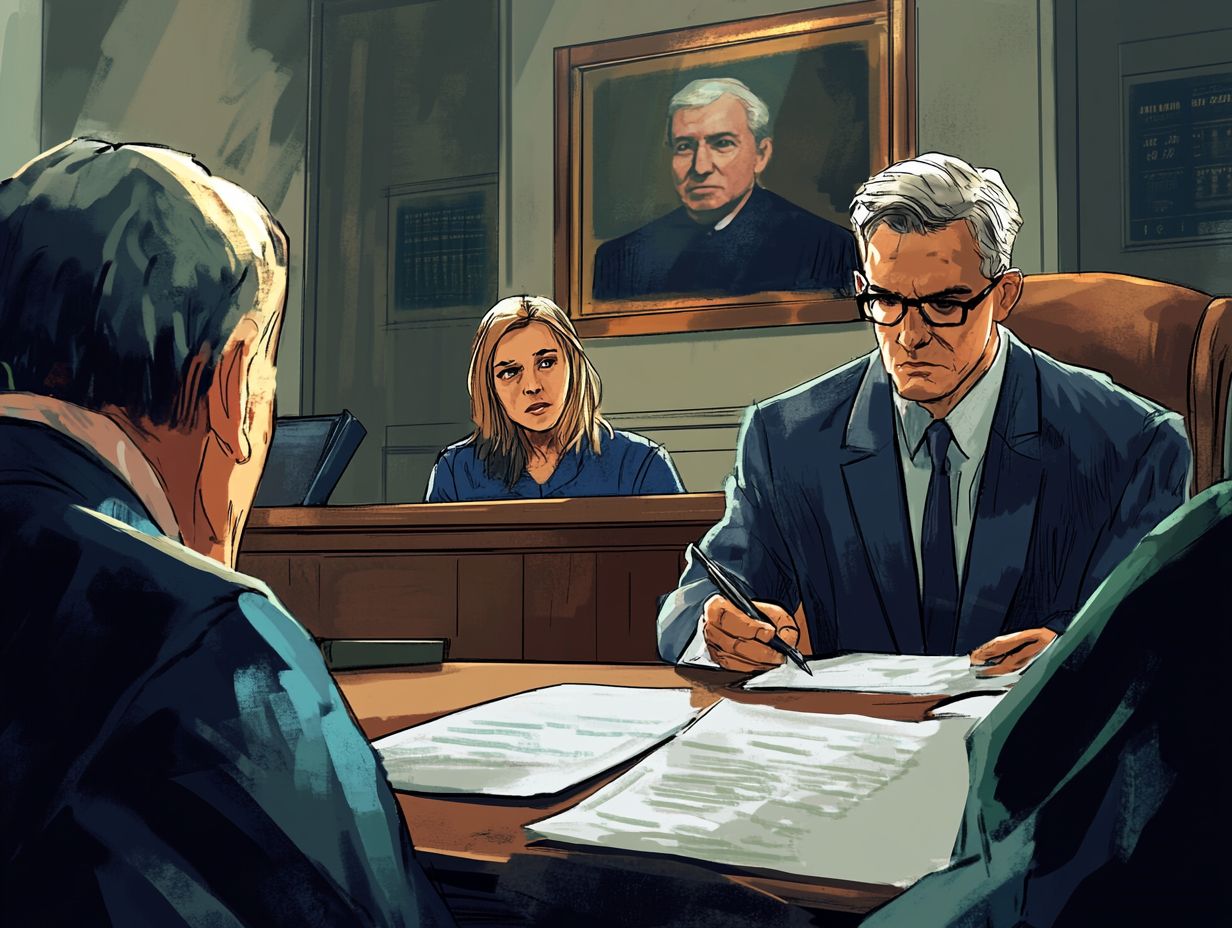
Ensuring a fair trial for the client is a paramount responsibility of defense counsel, deeply rooted in the principles of justice and the protection of client rights.
Protecting the Rights of the Accused
You must safeguard your client’s rights as a defense attorney. This ensures that constitutional rights and legal standards are upheld at every turn.
You play a vital role in maintaining the principles of justice enshrined in the Sixth Amendment and beyond. By fighting for fair trials, ensuring access to counsel, and protecting individuals against self-incrimination (forcing someone to testify against themselves), you safeguard essential freedoms that uphold the integrity of the judicial system.
Your careful review of evidence, challenges to prosecutorial misconduct, and commitment to ensuring that your clients fully understand the charges they face underline your dedication to justice.
Your efforts not only defend individual rights but also foster public confidence in the legal framework, highlighting the necessity of a balanced approach to criminal proceedings.
Frequently Asked Questions
Wondering about the key duties of a defense attorney?
What are the responsibilities of a defense attorney?
A defense attorney is responsible for representing and defending individuals or organizations accused of a crime. They have several important responsibilities as part of their role in the justice system.
What is the primary duty of a defense attorney?
The primary duty of a defense attorney is to advocate for their client’s best interests. This includes providing legal advice, building a strong defense strategy, and representing the client in court proceedings.
What are the ethical responsibilities of a defense attorney?
A defense attorney has ethical responsibilities to their client, the court, and the legal profession. This includes maintaining confidentiality, avoiding conflicts of interest, and upholding the principles of justice and fairness.
What is the role of a defense attorney during a trial?
During a trial, a defense attorney presents evidence, cross-examines witnesses, and argues on behalf of their client. They also have a duty to object to any evidence or testimony that they believe is inadmissible or unfair to their client.
What are the responsibilities of a defense attorney in a plea bargain?
In a plea bargain, a defense attorney negotiates with the prosecution on behalf of their client. They must ensure that the terms of the plea agreement are fair and in the best interests of their client.
What other responsibilities does a defense attorney have?
A defense attorney also engages in pre-trial motions, conducts legal research, and keeps clients informed about their case developments. This comprehensive involvement ensures the best possible outcome for their clients.
Responsibilities of a Defense Attorney
The primary duty of a defense attorney is to advocate for their client’s best interests. This includes providing legal advice and building a strong defense strategy.
During a trial, a defense attorney presents evidence, cross-examines witnesses, and argues for their client. They also object to any unfair evidence or testimony.
When negotiating a plea bargain, a defense attorney ensures the terms are fair and in the best interest of their client.
A defense attorney has several key responsibilities. They conduct legal research, prepare legal documents, and stay informed about changes in the law.




